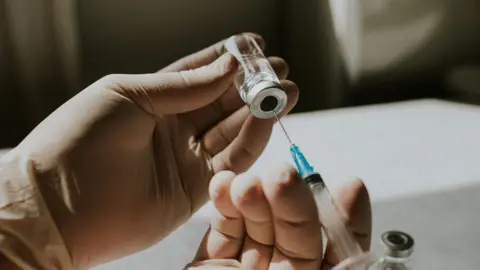Announcement imminent on NI gonorrhoea vaccinations
 Getty Images
Getty ImagesNorthern Ireland's Department of Health has said that it is considering whether to vaccinate people against the sexually transmitted infection, gonorrhoea.
On Wednesday it was announced that England will be the first country in the world to start vaccinating people against the infection.
The vaccine is 30-40% effective, but NHS England hopes it will reverse soaring numbers of infections.
Asked if Northern Ireland would also begin vaccinations, the Department of Health said: "This issue is being considered, and an announcement is expected to be made shortly."
Gonorrhoea is now the most prevalent STI diagnosed in sexual health clinics in Northern Ireland, according to the Public Health Agency (PHA).
PHA figures for Northern Ireland show that between 2021 and 2022 the number of cases jumped from 652 to 1,606 - the highest number recorded by the PHA.
There were 951 cases in 2019, but that dropped to 455 in 2020, likely due to changes in behaviour and healthcare associated with the Covid pandemic.
In 2023 there were 1,561 new cases, accounting for almost a third (28%) of all new STI diagnoses in Northern Ireland.
Of those diagnosed 75% were males, and of those 67% were gay, bisexual, and men who have sex with men.
The vaccine in England will not be available for everyone.
The focus will mainly be on gay and bisexual men with a history of multiple sexual partners or an STI.
Gonorrhoea does not always have symptoms, but they can include pain, unusual discharge, inflammation of the genitals and infertility.
What is gonorrhoea?
Gonorrhoea is easily passed from person to person through unprotected sex.
About one in 10 infected men and almost half of infected women do not experience any symptoms.
The infection can be passed from a pregnant woman to her baby, and without treatment, can cause permanent blindness for a newborn baby.
It is not spread by non-sexual contact like hugging.
It is not transmitted through surfaces and materials like toilet seats, towels, cups or plates.
If you've had successful treatment for gonorrhoea before, you can still catch it again.
Source: NHS.
